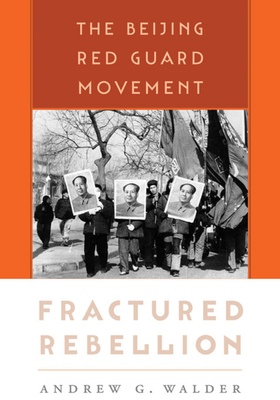

 Harvard University Press
Harvard University Press
Fractured Rebellion: The Beijing Red Guard Movement


Key Metrics
- Andrew G Walder
- Harvard University Press
- Paperback
- 9780674064133
- 9.1 X 6.1 X 1.1 inches
- 1 pounds
- History > Asia - China
- English
 Secure Transaction
Secure TransactionBook Description
Fractured Rebellion is the first full-length account of the evolution of China's Red Guard Movement in Beijing, the nation's capital, from its beginnings in 1966 to its forcible suppression in 1968. Andrew Walder combines historical narrative with sociological analysis as he explores the radical student movement's crippling factionalism, devastating social impact, and ultimate failure.
Most accounts of the movement have portrayed a struggle among Red Guards as a social conflict that pitted privileged conservative students against socially marginalized radicals who sought to change an oppressive social and political system. Walder employs newly available documentary evidence and the recent memoirs of former Red Guard leaders and members to demonstrate that on both sides of the bitter conflict were students from comparable socioeconomic backgrounds, who shared similar--largely defensive--motivations. The intensity of the conflict and the depth of the divisions were an expression of authoritarian political structures that continued to exert an irresistible pull on student motives and actions, even in the midst of their rebellion.
Walder's nuanced account challenges the main themes of an entire generation of scholarship about the social conflicts of China's Cultural Revolution, shedding light on the most tragic and poorly understood period of recent Chinese history.
Author Bio
Andrew G. Walder is the Denise O'Leary and Kent Thiry Professor in the School of Humanities and Sciences, and Senior Fellow in the Freeman Spogli Institute for International Studies. Previously, he served as chair of the Department of Sociology, as director of the Walter H. Shorenstein Asia-Pacific Research Center, and as Director of the Division of International, Comparative and Area Studies in the School of Humanities and Sciences.
A political sociologist, Walder has long specialized on the sources of conflict, stability, and change in communist regimes and their successor states. His publications on China have ranged from the political and economic organization of the Mao era to changing patterns of stratification, social mobility, and political conflict in the post-Mao era.
Another focus of his research has been on the political economy of Soviet-type economies and their subsequent reform and restructuring. His current research focuses on popular political mobilization in late-1960s China and the subsequent collapse and rebuilding of the Chinese party-state.
Walder joined the Stanford faculty the fall of 1997. He received his PhD in sociology at the University of Michigan in 1981 and taught at Columbia University before moving to Harvard in 1987. As a professor of sociology, he served as chair of Harvard's MA Program on Regional Studies-East Asia for several years.
From 1995 to 1997, he headed the Division of Social Sciences at the Hong Kong University of Science and Technology. From 1996 to 2006, as a member of the Hong Kong Government's Research Grants Council, he chaired its Panel on the Humanities, Social Sciences, and Business Studies.
His recent publications include Agents of Disorder: Inside China's Cultural Revolution(Harvard University Press, 2019); "The Impact of Class Labels on Life Chances in China" (with Donald J. Treiman), American Journal of Sociology(2019); "The Dynamics of Collapse in an Authoritarian Regime: China in 1967" (with Qinglian Lu) American Journal of Sociology(2017); China Under Mao: A Revolution Derailed (Harvard University Press, 2015); "After State Socialism: The Political Origins of Transitional Recessions" (with Andrew Isaacson and Qinglian Lu), American Sociological Review(2015); "Rebellion and Repression in China, 1966-1971," Social Science History(2014); Fractured Rebellion: The Beijing Red Guard Movement (Harvard University Press, 2009); "Revolution, Reform, and Status Inheritance: Urban China, 1949-1996" (with Songhua Hu), American Journal of Sociology (2009); "Ownership, Organization, and Income Inequality: Market Transition in Rural Vietnam" (with Giang Hoang Nguyen) American Sociological Review (2008); "Ambiguity and Choice in Political Movements: The Origins of Beijing Red Guard Factionalism," American Journal of Sociology (2006); and "Political Sociology and Social Movements," in Annual Review of Sociology (2009).
Source: Stanford University School of Humanities and Sciences
Videos
No Videos
Community reviews
Write a ReviewNo Community reviews